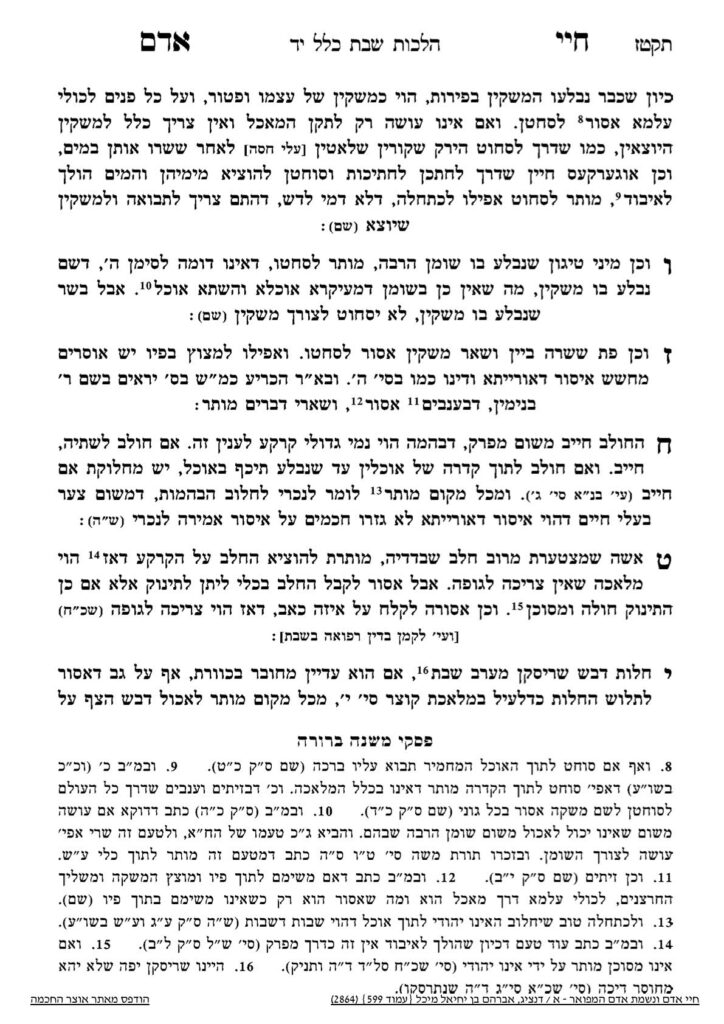We are continuing in siman 8, discussing choleiv (milking), which is a toldah of dosh. We have learned (s0384) that one of the issues with applying mashkeh habaah l’ochel in regards to milking directly into a food is that the animal is not always considered a food itself (and therefore we cannot view the milk as never becoming a liquid). There is a difference between Shabbos and Yom Tov in this regard. To explain, the Chayei Adam holds that one should refrain from relying on mashkeh habaah l’ochel, because it is analogous to boser. On Yom Tov, one can shecht the animal, so there is more of a reason to view the animal as food as well. If so, one can be more lenient on Yom Tov regarding relying on mashkeh habaah l’ochel. We still have other concerns about relying on mashkeh habaah l’ochel, such as ensuring that the milk actually benefits the food or that the milk is absorbed primarily into food.
In siman 9, the Chayei Adam discusses a woman who needs to relieve herself of excess milk. Obviously, if it is life threatening for the child, in that the child’s only sustenance is from the mother, the child can suckle from the mother.
Once it is no longer life-threateningly necessary for the child to suckle from the mother, it is still muttar for the child to nurse from the mother. It is the paradigmatic derech achilah, and therefore does not fall within the melacha of sechita at all.
The questions begin when the mother needs to relieve the milk due to pain of the excess milk. The milk will be stored in order for the child to use at a later time. All things being equal, it is an issur deoraysa of sechita for her to do so. If the child will not drink the milk without her first expressing the milk, such that it is life-threatening for the child if the mother does not express milk, it is obviously muttar for her to express the milk. If that is not the case, using a hand pump is a melacha deoraysa. Using an electric pump would be a melacha deoraysa as well, in that setting the machine and turning it on is considered one’s direct act.
If the machine is on a timer, and one places the machine onto the body before the machine turns on, it is considered a grama. Grama is muttar in a case of need, so one can rely on this grama set up in a case of a child who needs the milk but for whom it is not life-threatening (if it were life-threatening, the direct actions would be muttar, as discussed above).
If the woman wishes to relieve the milk due to the pain, and does not necessarily need to save the milk, she can express the milk directly onto the ground. It is a melecha she’eina tzricha legufa, and we learned that arguably it may not even have the status of a melacha, since it is directly discarded and therefore may not fulfill the criteria of sechita at all (shiur s0383).
Once the woman is expressing the milk to discard it and does not need it for the child, she cannot save the milk for a child.
Similarly, there were certain types of illnesses where it was believed that expressing milk directly onto the source of the illness would be beneficial. These illnesses were not life-threatening, so the Chayei Adam writes that it is assur to express the milk on Shabbos, because it would become a melacha she’tzricha legufa.
The Chayei Adam clarifies that when a woman is expressing milk due to pain, it is not enough to catch the milk in a utensil and then discard the utensil. Rather, it must be expressed in a manner in which it is immediately discarded. One can place soap or some other spoiling agent into the utensil rather than express it directly onto the floor.
One can ask a non-Jew to place the pump on the woman and any other relevant amira l’achum.
Summary
- A baby can suckle directly from its mother and there is no issue of sechita, because it is derech achila for the baby.
- If a woman wishes to express excess milk due to pain, she cannot place and activate a pump directly, but can express the milk directly in a manner which spoils it, rely on grama to place the machine on a timer, or ask a non-Jew to work the machine.
- If there is any question of a life-threatening need, the woman can do whatever is necessary for the baby.



